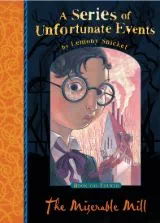The Reptile Room by Daniel...
The second book in the series again follows t...
By Kathy Graves1431

0

The fourth book in the series takes the orphans to a new bizarre guardian after the first three have failed to protect them from Count Olaf. Mr. Poe now takes them to a mill, where a manager is a man called Sir.
This is probably one of the most absurdist books in the series, as Sir condones child labor by making the children work in his mill and without paying anyone money. Instead, he gives them gum and coupons for their efforts.
What the Baudelaires like about their new guardian is the protection he offers against Count Olaf, but the world of the series prevents anyone from seeing Count Olaf behind the ridiculous disguises he loves to wear every book. This speaks volumes about what Handler is really alluding to in the real world.
The Baudelaires start working at the mill and meet Sir’s partner, and they start exploring the area. Klaus begins to act differently, which worries his two sisters. An incident results in breaking Klaus’s glasses and leads the orphans to take him to the optometrist nearby whose name is Dr. Orwell. She examines Klaus and it’s then that he starts acting strangely.
There they also meet Dr. Orwell’s new female receptionist Shirley, who is actually Count Olaf in a new silly disguise. It turns out that Dr. Orwell is working with Count Olaf to steal their fortune. Eventually, they discover that Klaus was hypnotized by the doctor and they manage to un-hypnotize him and escape Count Olaf for the fourth time.
This book, while light-toned, ridiculous to no end, and good material for children's reading, it still offered more adult content. The book featured a set of vocabulary that Handler likes to define in the funniest of ways. For example, Handler explains that the word “Egad!” is “an expression which means “Oh no! He’s escaping!” and “nefarious” means “Baudelaire-hating”.
The Miserable Mill, like all the books in this series, illustrates how the children are adept at problem-solving using their skills and the books they find around them. So, reading this series might be good for children, as it will make them more inclined to use the same methods the Baudelaires are using.
Updated 4 years ago